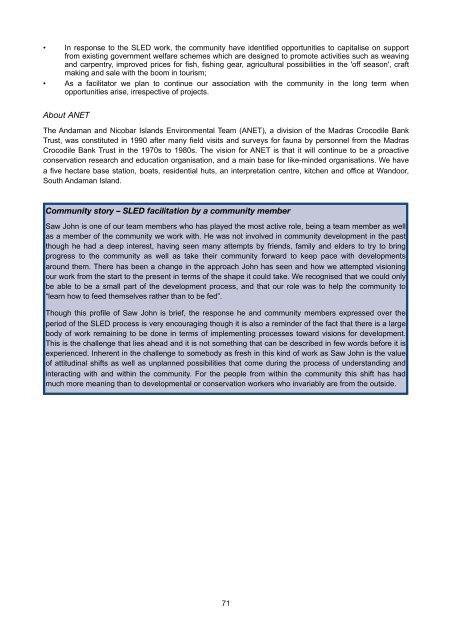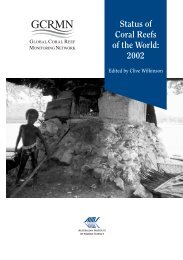Sustainable Livelihoods Enhancement and Diversification (SLED)
Sustainable Livelihoods Enhancement and Diversification (SLED)
Sustainable Livelihoods Enhancement and Diversification (SLED)
You also want an ePaper? Increase the reach of your titles
YUMPU automatically turns print PDFs into web optimized ePapers that Google loves.
• In response to the <strong>SLED</strong> work, the community have identified opportunities to capitalise on support<br />
from existing government welfare schemes which are designed to promote activities such as weaving<br />
<strong>and</strong> carpentry, improved prices for fish, fishing gear, agricultural possibilities in the 'off season', craft<br />
making <strong>and</strong> sale with the boom in tourism;<br />
• As a facilitator we plan to continue our association with the community in the long term when<br />
opportunities arise, irrespective of projects.<br />
About ANET<br />
The Andaman <strong>and</strong> Nicobar Isl<strong>and</strong>s Environmental Team (ANET), a division of the Madras Crocodile Bank<br />
Trust, was constituted in 1990 after many field visits <strong>and</strong> surveys for fauna by personnel from the Madras<br />
Crocodile Bank Trust in the 1970s to 1980s. The vision for ANET is that it will continue to be a proactive<br />
conservation research <strong>and</strong> education organisation, <strong>and</strong> a main base for like-minded organisations. We have<br />
a five hectare base station, boats, residential huts, an interpretation centre, kitchen <strong>and</strong> office at W<strong>and</strong>oor,<br />
South Andaman Isl<strong>and</strong>.<br />
Community story – <strong>SLED</strong> facilitation by a community member<br />
Saw John is one of our team members who has played the most active role, being a team member as well<br />
as a member of the community we work with. He was not involved in community development in the past<br />
though he had a deep interest, having seen many attempts by friends, family <strong>and</strong> elders to try to bring<br />
progress to the community as well as take their community forward to keep pace with developments<br />
around them. There has been a change in the approach John has seen <strong>and</strong> how we attempted visioning<br />
our work from the start to the present in terms of the shape it could take. We recognised that we could only<br />
be able to be a small part of the development process, <strong>and</strong> that our role was to help the community to<br />
“learn how to feed themselves rather than to be fed”.<br />
Though this profile of Saw John is brief, the response he <strong>and</strong> community members expressed over the<br />
period of the <strong>SLED</strong> process is very encouraging though it is also a reminder of the fact that there is a large<br />
body of work remaining to be done in terms of implementing processes toward visions for development.<br />
This is the challenge that lies ahead <strong>and</strong> it is not something that can be described in few words before it is<br />
experienced. Inherent in the challenge to somebody as fresh in this kind of work as Saw John is the value<br />
of attitudinal shifts as well as unplanned possibilities that come during the process of underst<strong>and</strong>ing <strong>and</strong><br />
interacting with <strong>and</strong> within the community. For the people from within the community this shift has had<br />
much more meaning than to developmental or conservation workers who invariably are from the outside.<br />
71
















